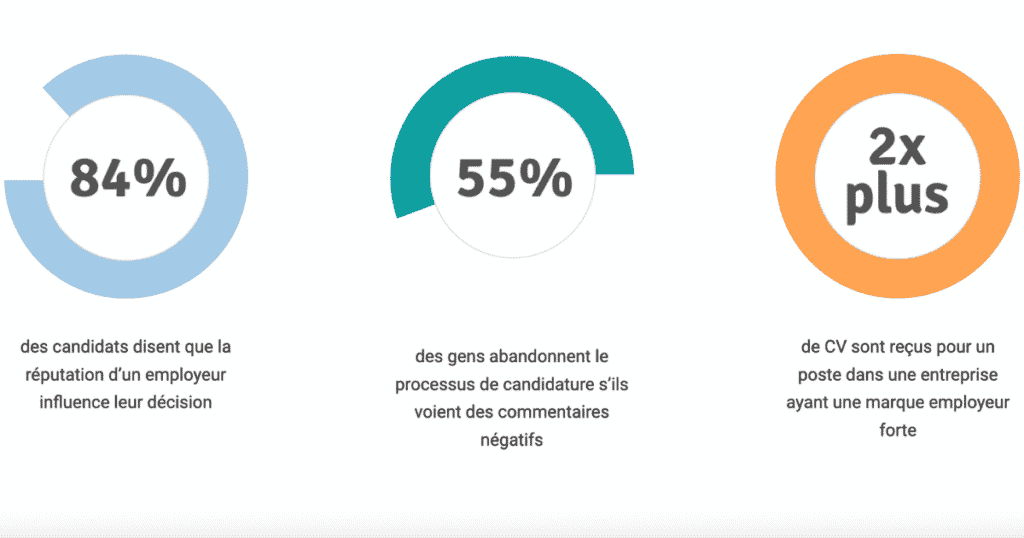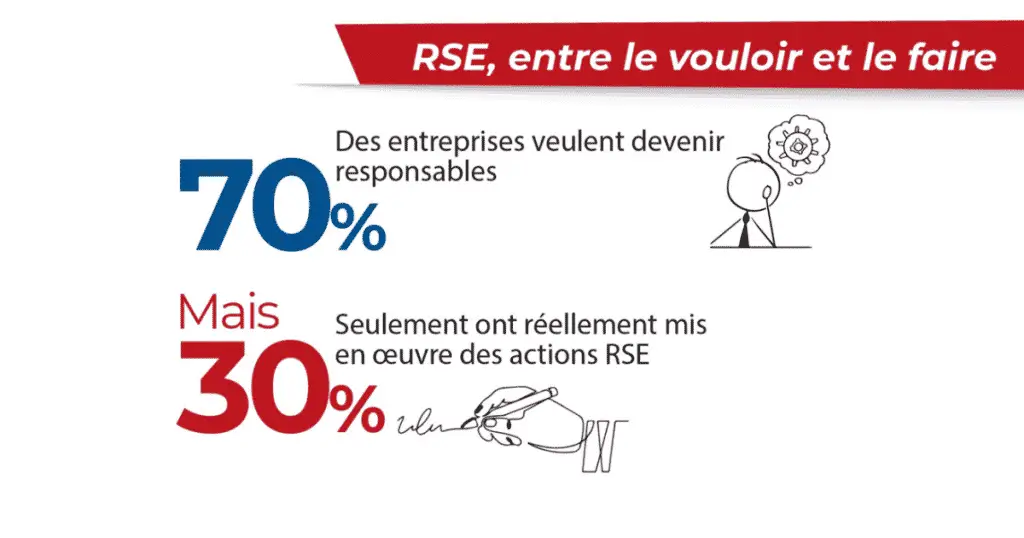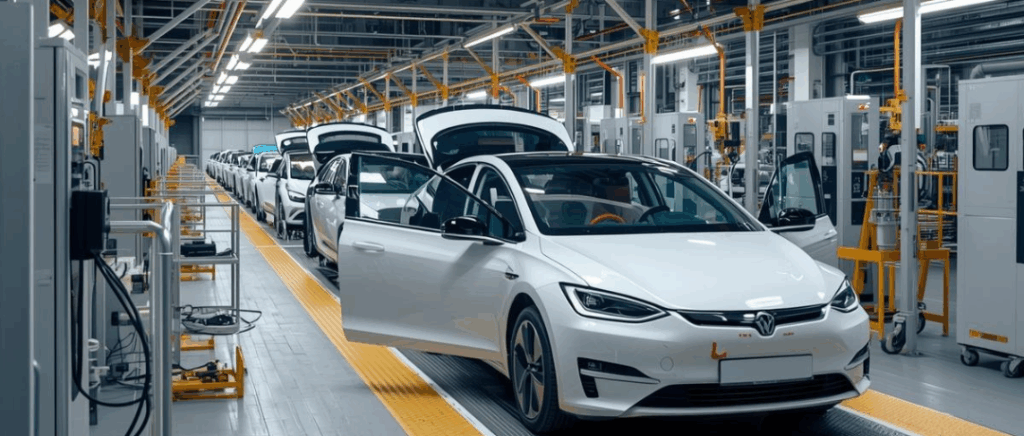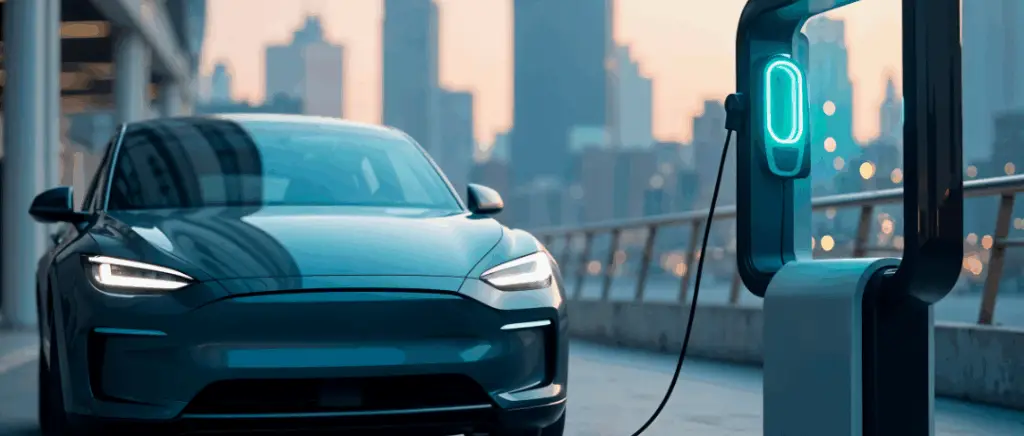Our experts answer your questions with a smile
Monday to Friday 9am - 12.30pm - 2pm - 7pm
Employer branding: how can we meet candidates' new expectations?
Employer branding refers to all the strategies deployed by a company or organisation to attracting potential talentbut also to build employee loyalty. Designed to develop the company's image and convey its values, it is a fundamental pillar of external and internal communication processes.
Employer branding is more than ever a driver of commitment and performance, and has become impossible to ignore. A company's brand image must meet the high expectations of job applicants, more and more of whom are considering it as a selection criterion for job offers. Directors and HR managers therefore have every interest in looking after their company's reputation, as this statistic demonstrates:
Source : bang marketing : ultimate employer brand guide.
At the same time, the aspirations of job applicants are changing.
In the past, the attractiveness of a company was essentially based on purely material aspects. The mention of financial advantages was the main lever for acquiring profiles. hard skills or "high potentials".
Today, the millennials is changing the game. Candidates from generations Y and Z have different concerns. Their actions are motivated more by an awareness of the urgency of climate change. For these young working people, preserving the environment is a priority. Of course, they do not have a monopoly on ecological commitment, but they willingly integrate sustainable development into their decision-making.
According to a study reported by RH Calexa79 % of millenials working people consider CSR to be a major criterion in their job search".
To effectively cultivate its employer brand, a company needs to be in tune with the values of its future recruits.
The latter do not hesitate to scrutinise the extent of their commitment, going so far as to boycott potential employers. According to one recent survey published by Harris InteractiveTwo out of three young people say they would not apply for a job in a company that did not take environmental issues sufficiently into account".
Employer branding and sustainable development: a necessary alignment
Reconciling the employer brand and CSR (Corporate Social Responsibility) appears to be a winning strategy on a number of levels. It allows us to approach sustainable development not as a constraint, but as a vector of opportunities for the company. Every initiative taken in favour of the environment helps to create a positive image that can have a positive impact on the employer brand.
Under these conditions, a virtuous circle can be established: by improving its reputation, the company will be in a strong position to attract highly qualified profiles. At the same time, it will be able to improve its overall performance by strengthening the commitment of its employees. Because employer branding is also a lever for employee retention committed to defending the corporate values they consider to be their own. According to the Gallup consulting firmThe commitment of our employees will help to reduce the turnover of 24 %.
From commitment to action
Relying on CSR to define your employer branding strategy can only be successful if the company's message is backed up by concrete actions. It is essential to integrate this dynamic into every phase of recruitment and employee induction.
The ecological argument must be based on a sincere commitment. If this is not the case, it will be easy to accuse managers of making a mistake. from greenwashing.
The figures provided by Deloitte are very telling in this respect. If 70 % of organisations are aware that they need to become socially responsible, but only 30 % of them have taken real action.
Source : let's talk hr.
The challenge is to prioritise concrete measures that generate both meaning and measurable benefits for employees. The green mobility is undeniably one of the value-added actions that demonstrate a company's commitment to sustainable development.
The place of electric cars in a CSR employer branding strategy
The company fleet plays an essential role in building an employer brand based on CSR. More broadly, the sustainable modes of transport favoured by organisations are at the heart of the ecological transition begun in recent decades. La Mobility Orientation Law (LOM) requires organisations to include a quota of vehicles with low greenhouse gas emissions. The provisional timetable is based on a replace 50 % of polluting vehicles by 2030. At the same time, companies private and public must install charging stations for electric or hybrid vehicles in their car parks. The ratio is calculated on the basis of the capacity of the parking areas (from 5 % to 20 % depending on the size of the car park).
Providing electric vehicles to your employees or provide them with Electric Vehicle Charging Infrastructure (IRVE), such as charging stationsGreen mobility can become a competitive advantage in terms of employer branding. Deploying green mobility makes perfect sense when you enable your employees to act in line with their core values, while at the same time making their lives easier. What's more, this kind of approach can boost your company's attractiveness because it echoes their concerns in terms of mobility. After all, it's the right thing to do, 8 out of 10 French people would be prepared to switch to electric cars if their employer offered it to them.
Below are the main advantages of electric cars according to the French in 2021.
Source: ipsos via Statista.
Greening the company fleet obviously responds to ecological issues, since the electric vehicles meet carbon neutrality requirements.
But it also raises financial issues, in the context of rising fuel costs and development of low-emission zones (EPZ). Getting around Travelling to and from work, or to meet clients, has become a source of concern for the vast majority of working people. Visit electric carWhether for personal or professional use, it's the ideal solution. It frees you from the need to use expensive fossil fuels and from traffic constraints in conurbations where air quality standards are exceeded (Crit'Air sticker).
In short, making a concrete commitment to the sustainable mobility is not just about improving a company's image. It can influence job satisfaction through solutions that are both immediate and long-lasting. Positive feedback from employees can contribute to the employer brand and generate added value for the company.
What is good practice?
Organisations wishing to give priority to the use of electric vehicles can be supported by a number of schemes designed to benefit employees.
As a result, theSustainable Mobility Package (FMD)is governed by the Loi d'Orientation des Mobilités (LOM). It takes the form of financial assistance to promote sustainable travel between home and company premises. Paid by the employer, this financial compensation of up to €400 is tax-exempt. It is designed to encourage the use of environmentally-friendly means of transport, which of course includes the electric car car-sharing. The FMD includes the following methods of payment:
- Le mobility cardThis scheme, which has been in force since 1 January 2022, takes the form of prepaid tickets (a bit like luncheon vouchers) paid for at a rate of 50 % by the employer. It can be combined with the compulsory mobility aid for public transport.
- La transport premiumprovided for in certain collective agreements concerns employees who live outside the area covered by public transport or who work staggered hours (night work). It allows the beneficiary to obtain partial reimbursement of their fuel consumption. For owners of electric cars or plug-in hybrids, the payment is capped at €500/year.
Companies are not obliged to adopt or develop these systems. However, they do represent concrete actions that can enhance the employer brand argument during the recruitment process..
Installing recharging points on the premises of your employees: a good way of building loyalty!
Employees who own an electric company car and have to recharge it at home needinstalling a charging point at home. The most recent government grants, such as Ma Prime Rénov'In the case of individuals living in single-family homes, we plan to cover part of the installation costs.
But companies that offer to install charging points at their employees' homes have everything to gain. What better way of promoting green mobility, demonstrating your commitment to the environment and aligning your values with those of your employees? Not to mention the fact that such an approach will help to retain talent by laying the foundations for a long-term partnership.
Why install home charging points?
Despite technological innovations, the process of recharging a electric vehicle can monopolise it for several hours. Even if you have installed number of terminals If your company has sufficient parking spaces, these will not be enough to cover your employees' needs, especially if they want to use their company car in their free time (evenings or weekends). Installing charging stations in your employees' homes is a sustainable investment that will make all the difference. Your employees will enjoy optimum comfort, as they will be able to charge the battery of their vehicle at night and plan their journeys for the following day with complete peace of mind.
By opting for a connected terminal, you can more easily determine your employees' energy consumption and offer them precise compensation for expenses linked to business travel. You'll also be able to reduce administrative burdens by transmitting data on the energy consumption of company cars.
Another advantage, and not the least important, is that you'll be able to keep costs under control. Thanks to this equipment, your employees won't have to fill up at public recharging points, which are much more expensive!
Financial assistance for businesses
As a company, you can benefit from the Advenir scheme (subject to certain conditions).
Since 2016, the Advenir programme supports private individuals and businesses in financing the deployment of recharging stations. If your employees live in apartment blocks or blocks of flats, you can get a grant covering up to 50 % of the installation costs. This aid is capped according to the power of the charging point. For example, for individual use, the ceiling is set at €960 excluding VAT and for collective use, the amount is €1,600 excluding VAT.
Good to know: theThe installation of a charging point at your employees' homes has no tax implications, as it is not a taxable benefit. considered as a benefit in kind.
How do you finalise a home installation project?
The choice of a charging point for an electric car is not something you can improvise. To select the right model, you'll need to take into account the layout of your employee's home, as well as the type of electric vehicle and frequency of use (daily journeys from home to the office, trips to customers or suppliers, etc.).
Beev will be with you every step of the way, helping you to select the right equipment and find a competent installer. Do you need advice? Benefit from the support of one of our experts to finalise your project to install charging stations.
To develop your employer brand and improve recruitment, you can capitalise on your vehicle fleet. From deploying sustainable mobility to taking charge of installing charging points at your employees' premises, there are plenty of options available to you!







































